21 Jul 2015 | Magazine, mobile
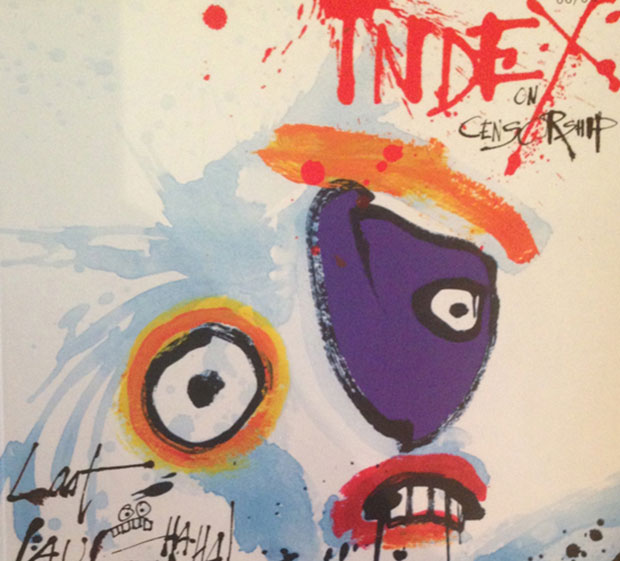
Whenever I’m trying to fill an hour of stand-up for the Edinburgh Festival, the last thing I wonder is, “Jeez, will this set land me a spot on television?” The reasons are twofold: first, I do what makes me laugh, otherwise I get bored; second, I’ve done stand-up on television and it ain’t the apex of my career. Television producers and editors seem to have an uncanny knack for siphoning the humour out of just about anything, especially the royals, and particularly the pretty, dead ones.
Yet television comedy is held in some oddly high regard as a move up for a comic. I guess that’s because if you can’t get a TV profile going, your live shows in the provinces don’t sell very well. Why should someone in, say, Leeds, come and see you at the Varieties if you aren’t good enough to be on Les Dawson?
But to be on Les, or any television programme, your set must be “clean”. Which means few or no dirty words. Misogyny within social norms, fine, but save the word “cunt” for the wife beatings, mate. That’s right. No “cunts”, although the halls of the BBC are teeming with them. Which is sad, since “cunt” is plainly the most versatile word in the English language. It’s a verb, a noun, an adjective, and it’s really the last word on earth that, no matter how it’s used, makes my mother angry. One is also discouraged from using the word “fuck” on television, particularly as a verb. Particularly if you’re gay.
See, as an out cocksucker, there are lots of things I can get away with on stage but, on television, I’m already perceived as dangerous. TV companies treat me, in rehearsal for a taping, as though I’m retarded or a child or, worse yet, American. “Please be nice, Mr Capurro. You want the people watching to like you, don’t you? Good. We wouldn’t want everyone to think that you’re naughty, would we?”
Then they go through the litany of words I’m not supposed to use. When the show is edited and televised, other comics’ “fucks” are left in. Mine are removed. After all, being gay is dirty enough. Do I have to be dirtier with my dirty mouth?
I’m not really complaining. I’ve learned to manoeuvre my way throughout television. I can play the spiky-but-warm, take-the-cock-out-of-my-mouth-and-press-the-tongueto-my-cheek game with squeamishly positive results. Usually. But in Australia, during the taping of a “Gala” to honour a comedy festival in Melbourne, the director had a grand-mal seizure when I described Jesus as a “queerwannabe”. I saw papers fly up over the heads of a stunned, strangely silent audience. Later I found out it was the director’s script. Apparently they found him after the show, huddled in a corner, crying like a recently incarcerated prisoner who’d just taken his first “shower”.
He was afraid I’d pollute minds, I suppose. At least that’s what he told his assistant. So now, TV is promoting itself as a politically correct barometer? A sort of big-eyed nanny looking out for our sensitive sensibilities? In the six years that I’ve been performing in the UK, I’ve seen political correctness catch on like an insidious disease, like a penchant for black, like the need to oppress. Comics use the term to describe their own acts during TV meetings, and everyone around the table nods in appreciation and approval. Or are they choking? I can never tell with TV people.
Maybe they’re suffocating under a pillow of their own stupidity, since no one really understands the meaning behind political correctness, the arch, high-browed stance it panders to. The phrase was coined as a reaction to racism in the US, to respond with a sort of kindness that had been stifled when hippies disappeared from the US landscape. PC took the place of sympathy which has, since Reaganomics, had a negative, sort of “girlie” tone to it that few US politicians, especially those who served in ‘Nam, can tolerate. Being politically correct makes the user feel more in control and smarter, because they can manipulate a conversation by knowing the proper term to describe, say, an American Indian.
‘They’re actually indigenous peoples now,’ a talk-show host in
San Francisco told me while on air recently. ‘The word Indian is
too marginal.’
‘But where are they indigenous to?’
‘Well, here of course.’
‘They’re from San Francisco?’
‘No. I mean, yes. My boss’ — we were discussing his producer, Sam —
‘was born and raised here, but his parents are Cherokee from Kansas. Or
was it his grandparents?’
‘My grandfather is Italian, from Italy. What does that make me?’
‘Good in bed.’
Indigenous, tribal, quasi or semi. All these words are used to describe, politely, “the truth”. But, strangely enough, the truth is camouflaged. The white user pretends to understand the strife of the minorities, their emotional ups and downs, their need for acceptance and understanding, when all the minorities require is fair pay. I’ve never met a struggling Costa Rican labourer who was concerned that he be called a “Latino” as opposed to a “Hispanic”. He just wants to feed his family. Actually, I’ve never met a struggling Costa Rican, period. But that’s because I’m one of the annoying middle class who keep a distance from anyone who’s not like them, but who also has the time and just enough of an education to make up words and worry about who gets called what.
To the targets, the people we’re trying to protect – the downtrodden, the homeless, the forgotten – we must appear naive and bored, like nuns. It’s a lesson in tolerance that’s become intolerant. As if to say: “If you don’t think this way, if you don’t think that a black person from Bristol is better off being called Anglo-African, you’re not only wrong, you’re evil!” It’s pure fascism, plain and simple. It’s as if Guardian readers had unleashed their consciousness on everybody else, and so it’s naughty to make jokes about blacks, unless you’re black, and bad to make fun of fat people, if you’re not fat, etc. Suddenly, everyone is tiptoeing around everyone else, frightened they’ll be labelled racist because they use the word “Jew” in a punchline. Or horrified someone will think them misogynist because they think women deal better with stress.
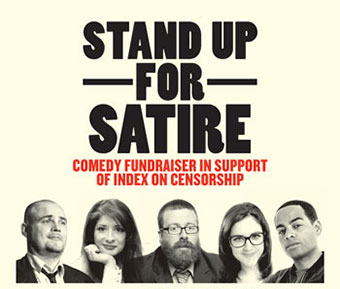 Index on Censorship has been publishing articles on satire by writers across the globe throughout its 43-year history. Ahead of our event, Stand Up for Satire, we published a series of archival posts from the magazine on satire and its connection with freedom of expression.
Index on Censorship has been publishing articles on satire by writers across the globe throughout its 43-year history. Ahead of our event, Stand Up for Satire, we published a series of archival posts from the magazine on satire and its connection with freedom of expression.
14 July: The power of satirical comedy in Zimbabwe by Samm Farai Monro | 17 July: How to Win Friends and Influence an Election by Rowan Atkinson | 21 July: Comfort Zones by Scott Capurro | 24 July: They shoot comedians by Jamie Garzon | 28 July: Comedy is everywhere by Milan Kundera | Student reading lists: Comedy and censorship
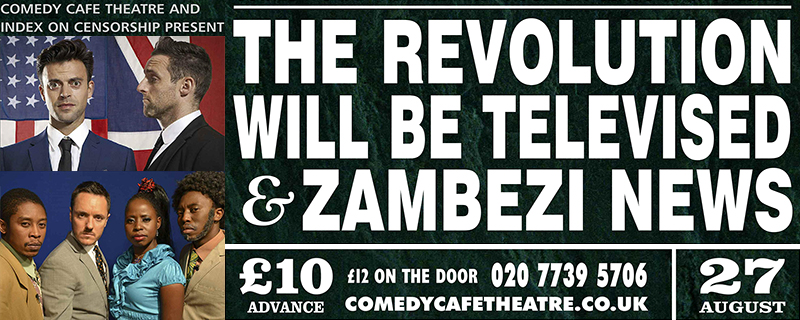
Somehow we’ve forgotten that it’s all in how you say it. To read a brilliant stand-up comic’s act is pedantic, but to see it performed is breathtaking. That’s because what we say might be clever, but the way we arrange and self-analyse and present is where the fun comes in. Same with all those words we use. They’re not “racist” or “dangerous” by definition.
Speaking of definitions, let’s talk about the word “gay”. Lots of people I meet are concerned about what I should be called. Is it gay, which pleases the press, or queer, which pleases the hetero hip, since they think gays are trying to reclaim that word? The fact is that all those words are straight-created straight identifiers. Gay is a heterosexual concept. It’s a man who looks like a model, dresses like a model and has the brain of a model. He has disposable income, he loves to travel, and he adores – thinks he sometimes is – Madonna. He’s a teenage girl really and straights love objectifying him the -way they do teenage girls. Or the way they do infants. Try watching a diaper commercial with the sound off. It’s like porn. You’ll think you’re in a bar in Amsterdam.
I’m about as comfortable with the word “gay” as I am with kiddy porn. I’d prefer to be called a comic. Not a gay comic. Not a queer comic. Not even a gay, queer comic, or a fierce comic, or an alternative comic. It’s just the mainstream trying to pigeonhole me, trying to say, OK, he’s gay, so it’s OK to laugh at his stuff about gays. Which is why, partially, in my act, I make fun of the Holocaust by saying “Holocaust, schmolocaust, can’t they whine about something else?”
The line is meant to be ambiguous, initially. It’s meant to start big, and then the actual subject gets small, as I discuss ignorance about the pink triangle as a symbol of oppression, which has since been turned into a fashion accessory. Like the red ribbon, it makes the PC brigade feel like they’ve done their part to ease hatred in the world by adorning their lapel with a pin. When pressed, they’re not even sure what oppression they’re curing, or why they should cure oppression, or how they’re oppressed.
But if you make fun of that triangle, or this Queen Mum, or that dead Princess, suddenly you’re — why mince — I’m the bad guy. I’ve broken away from the pack. I’m not acting like a good little queer should. I’m not being silent about issues that don’t concern a modern gay man, like hair-dos and don’ts. I’m being aggressive, I’m on to. And those straights, those in charge, the folks looking after “my minority group”, don’t like rolling over.
Nor are some cocksucking idiots happy about being bottom-feeders either. Which is why I come out against abortion in my act, and in support of the death penalty since, in the US at least, the two go hand in manicured hand. There I go, losing my last supporters: young women and single gay men. How can I say: “If you wanna talk Holocaust, how about abortion, ladies? 50 million. Can you maybe keep your legs together?”
That is truly evil. No, not really evil. Just wrong. Why? Particularly when I’m only opposed to abortion as a contraceptive device. Who decides what I can and cannot say? Isn’t it the people that aren’t listening? If I’ve got a good joke about it, a well-thought-out attack and a point to make, why is it bad? Why is the world dumbing down almost as fast as Woody Allen’s films? Why does it bother me? Why not just do my same old weenie jokes, keep playing the clubs and sleep with closeted straight comics? Just doing those three things – particularly the last – would keep me very busy and distracted, which is what “life” is all about.
But I imagine that when people go for a night out, they wanna see something different. It’s a big deal finding a babysitter, getting a cab, grabbing a bite and sitting your tired ass into a pricey seat to hear some faggot rattle on for an hour. So I try to offer them a unique perspective. One that might seem overwrought, desperate, or strangely effortless, but one that might make them look at, say, an Elton John photo just a bit differently next time
Look, it’s not my job to find anyone’s comfort zones. I don’t give a shit what people like, or think they like, or want to like. I’m not a revolutionary. I’m just a joke writer with an hour to kill, who wants to elevate the level of intelligence in my act to at least that of the audience.
If in doing that, I get a beer thrown at me or I lose a “friend” (read: jealous comic) then so be it. In the meantime, I’ll keep fending off my growing array of fans that are sick and tired of being lied to and patronised.
Gosh, get her! I mean me. Get me, sounding all holier than, well, everybody. Strangely enough, the more I find my voice on stage, the more serious comedy becomes for me. Maybe I should go back to telling those “Americans are so silly” jokes before I lose my mind, and throw all my papers up in the air.
Scott Capurro is a San Francisco-based stand-up whose performance at the
Edinburgh Fringe in August ended in uproar after he ‘made jokes’ about the
Holocaust. His book, Fowl Play, was published by Headline in September
1999
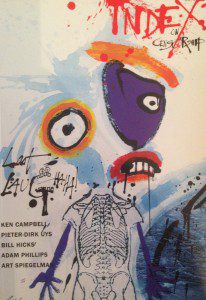
This article is from the November/December 2000 issue of Index on Censorship magazine and is part of a series of articles on satire from the Index on Censorship archives. Subscribe here, or buy a single issue. Every purchase helps fund Index on Censorship’s work around the world. For reproduction rights, please contact Index on Censorship directly, via [email protected]
6 Jan 2015 | Egypt, Middle East and North Africa, News and features
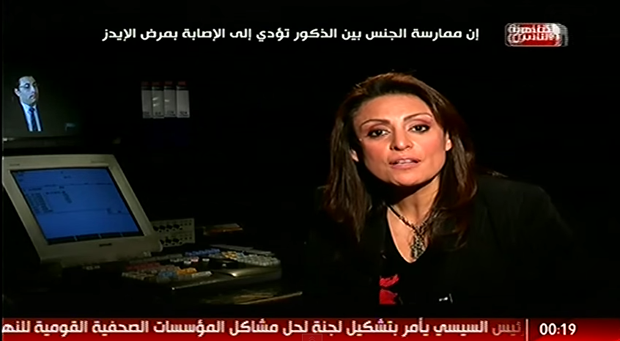
Journalist Mona El Iraqi colluded with security forces in a raid on a public bathhouse allegedly frequented by gay people (Image: Al Kahera Wal Nas TV Network/YouTube)
When prominent Egyptian actor Khaled Abul Naga criticised President Abdel Fattah El Sisi counter-terrorism policies in Sinai in a video posted on the El-Bawaba news website last November, he was slammed by government loyalists and Egypt’s pro-regime media.
Lawyer Samir Sabry, notorious for filing legal complaints against opposition activists, filed a lawsuit against Abul Naga accusing him of “treason” and “inciting anti-government protests”. In a telephone interview with the Egyptian privately-owned satellite channel Sada El Balad, Sabry said “those who go against the will of the people who elected El Sisi, must be punished”.
Abul Naga’s prosecution reflects the growing intolerance in Egyptian society and the persistent intimidation of dissenters since the ouster of Islamist President Mohamed Morsi some eighteen months ago. Since the military takeover of the country on 3 July, 2013, anyone expressing a view that runs counter to the official narrative is labeled a “traitor” and a “spy” by supporters of Egypt’s military-backed regime.
Even more disturbing than the criminal charges faced by Abul Naga is the barrage of insults hurled at him by government loyalists in the media who poked fun at the actor’s alleged sexual orientation.
Talk show host Tawfiq Okasha scandalously mocked Abul Naga’s sexuality, hinting that the actor was gay.
“Why do you sleep on your stomach and not on your back?” the controversial TV presenter (and owner of Faraeen Channel) asked, adding that there must have been a reason why Abul Naga was exempted from military service.
Mazhar Shaheen, a pro-government cleric who presents a talk show on a privately-owned satellite channel, also scoffed at Abul Naga, suggesting that he leave the country.
“If you are not happy with the military’s performance, you should go to either Syria or Iraq,” he said, addressing Abul Naga.
“But watch your pants while you are there,” he sarcastically warned.
Abul Naga’s lampooning by the pro-government media reflects the shrinking space for free expression in today’s Egypt. It also highlights the increased vulnerability of and continued discrimination against the LGBT community in Egypt’s deeply conservative society.
In recent months, Egypt’s gay population have increasingly been targeted amid a brutal crackdown that has seen 150 suspected homosexuals arrested and detained since November. While Egyptian law does not expressly ban homosexuality, gay people are frequently charged with “debauchery” and detained. Muslim scholars and prosecutors have condoned the arrests, arguing that “homosexuals are shameful to God” and that “it is the government’s duty to protect morality” — a conservative view that is widely shared by the Egyptian public. A Pew survey conducted in 2013 found only three per cent of Egyptians accept homosexuality.
While disdain for homosexuality is not new in Egypt, inflammatory reporting by Egypt’s pro-government media has in recent months further fuelled prejudice against gay people and deepened the stigma associated with homosexuality.
Last month, TV reporter Mona El Iraqi who works for the privately-owned Al Kahera Wal Nas TV channel, colluded with security forces in a raid on a public bathhouse in downtown Cairo, allegedly frequented by gay people. Iraqi used her cell phone to take pictures of 26 half-naked men wrapped only in bath-towels as they were arrested. After sending undercover agents to the bathhouse to spy on visitors, she alerted the police, claiming that “promiscuous orgies” were taking place there. On 7 December, police — accompanied by Iraqi’s camera crew stormed the bathhouse and indiscriminately arrested the suspects.
Iraqi unashamedly posted pictures of the half-naked men on her public Facebook page. The images were removed a couple of hours later after she was lambasted by rights activists enraged by what they described as her “insensitivity” and “flagrant intolerance”. Defending her actions in a Facebook post, she insisted that the bathhouse was a “hotbed of immorality” and was “helping spread HIV and AIDS in Egypt”.
Despite the outpouring of horror over the bathhouse raid on social media networks, Iraqi’s episode was broadcast to “mark World AIDS Day and spread awareness about the causes of HIV and AIDS in Egypt” — according to Iraqi.
The 26 men who were arrested were charged with “debauchery” and subjected to intrusive anal checks to determine their sexuality. Human Rights Watch has decried the anal examinations, describing them as being in violation of “international standards against torture“. The forensics report claimed that two of the 26 defendants may have been subjected to rape as signs of struggle were evident on the bodies of the men in question. At the trial last Sunday, defence lawyers argued however, that it was almost impossible to verify whether the men had indeed practiced homosexuality. They also slammed the decision to allow Iraqi to film the arrests, describing the move as “unconstitutional”. Denouncing the arrests, they said it was only natural for the men to have been naked “for they were either in the shower or the steam bath when police stormed the premises”. Khaled Naqash, one of the defence lawyers meanwhile, claimed his client had been fully dressed but was stripped naked by the police before his arrest. The defendants’ families were barred from entry into the courtroom and complained they were “ruffled up” by security guards who had apparently already condemned the defendants even before the verdict has been pronounced. The trial has been adjourned until 12 January when the fate of the men will be decided.
The latest mass arrests are reminiscent of the 2001 so-called “Queen Boat raid“, when security forces stormed a floating nightclub moored on the Nile in Cairo’s affluent neighbourhood of Zamalek, arresting 52 men. That incident sparked international outrage and condemnation and sent a chilling message to Egypt’s LGBT community. Rights advocates say the latest arrests are even more disturbing than the Queen Boat incident as they show media colluding with the police instead of holding security forces to account for their actions.
The bathhouse raid also comes hot on the heels of similar raids on gay hangouts in Cairo in recent months including cafes, bars and even private house parties. In March last year, four men were arrested in a raid on a house party after police allegedly found the men dresses in women’s clothing. The men were accused of “debauchery” and sentenced to eight years in prison. In September, a video of an alleged “gay wedding ceremony” posted online prompted the arrest of another eight men including the alleged “gay couple” who were seen in the video exchanging rings and hugging. While all the men had reportedly tested “negative” for homosexuality, they were nevertheless, sentenced to three years in prison each. A Cairo appeals court later reduced the sentences to one year in prison. The court also ruled however, that the men would remain under police surveillance after completing their jail terms. Last Sunday, El Youm El Sabe’ reported that two men were arrested in Alexandria by “morality police” and charged with “debauchery” and “destroying public morals”.
The recent spate of mass arrests of gay suspects has sparked serious concerns for Egypt’s LGBT community.
“I no longer feel safe,” Karim, a 26 year-old Egyptian homosexual told Index. “Egypt has never been safe for us but things are worse now under the military-backed authorities because we know we are being targeted.” He explained that the current regime was trying to woo the conservatives in the society by “appearing more Islamist than the ousted Islamist regime”.
“I’m always looking over my shoulder now and constantly live in fear,” said Mohamed, 32, another member of Egypt’s LGBT community. “I would leave Egypt if I could.”
For Mohamed and other gay people in Egypt, what is even more worrying than persecution and prosecution is the humiliation and shame they may bring onto their families if their identities were revealed — as has happened with the defendants in the recent bathhouse case.
“Now that the media is aligned with the police, we are at serious risk of public defamation and loss of dignity,” he lamented.
“What is even sadder is that few Egyptians are denouncing the arrests of gays as some media are telling the public that homosexuality is a disease that will destroy public morality and hence, it is necessary to rid the society of the scourge,” he added.
Buthayna Haleem ( her name has been changed to protect her identity) an Egyptian lesbian writer is one of the few people in Egypt condemning the raids.
“It is not something that concerns others,” she told Agence France Press in a recently televised interview. “This is oppression against people.”
Update: An earlier version of this article incorrectly stated Mona Iraqi had removed the images posted to Facebook. Facebook removed the images because they violated the service’s terms.
This article was published on 6 January 2015 at indexoncensorship.org
27 Aug 2014 | Asia and Pacific, India, News and features
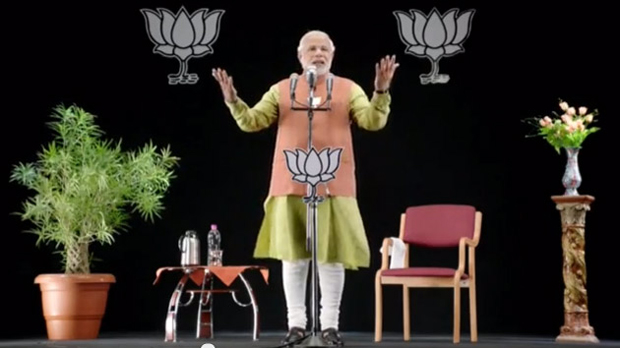
While campaigning to become prime minister, Narendra Modi addressed voters through 3D technology on several occasions (Photo: Narendramodiofficial/Flickr/Creative Commons)
Indians don’t usually take much notice of the prime minister’ speech on independence day in the middle of August. This year was different. This year there was so much discussion on social media that it became a trending topic.
In contrast to the way other prime ministers have handled this moment, new Prime Minister Narendra Modi of the Bharatiya Janata Party (BJP), wowed a large section of Indian society not just with what he said, but the way he said it. People are gushing over the fact that he spoke without notes, and did not use the usual bulletproof glass. Others are impressed with the content; he touched upon topics as diverse as rape, sanitation, manufacturing, and nation building, using easily accessible language. Modi is also using social media to get his views across direct to the public, and bypassing the mainstream media.
This straight-talking style only adds to Modi’s brand, but he is also attracting criticism from the mainstream media for not being willing to answer hard questions. His chosen methods of communicating with the public have one common thread: he prefers to address the public directly, plainly, without going through the mainstream media or any reliance on further explanation by them. His social media accounts on Facebook and Twitter have completely changed the way information comes out of the prime minister’s office (PMO). Modi’s tweets, both from his personal and his prime ministerial account, keep citizens updated on his various trips (“PM will travel to Jharkhand tomorrow. Here are the details of his visit”). He also updates on his musings (“I am deeply saddened to know about Yogacharya BKS Iyengar’s demise & offer my condolences to his followers all over the world”) and highlights from speeches made across the country (“when the road network increases the avenues of development increase too”), as well as photographs and videos. Citizens are getting a front row seat at his speeches and thoughts. But not everybody is happy about this — especially not the private mainstream media.
Unlike the previous government, Modi is yet to appoint a press advisor. That person, normally chosen from senior journalists in New Delhi, advises the prime minister on media policy. There isn’t a point person from the PMO for the mainstream media — or the MSM, as it is called — to discuss stories and scoops. He only takes journalists from the public broadcasting arms — radio and TV — on his foreign trips, in contrast to his predecessor, who brought along more than 30 journalists from the public and private channels. In fact, Modi has reportedly instructed his MPs to refrain from speaking to journalists. Indian mainstream media is filled with complaints that Modi is denying journalists the opportunity to engage with complex subjects like governance beyond official statements and limited briefings. Meanwhile, some other publications have scoffed that the mainstream media is only complaining because it will be forced to analyse the news and work towards coherent reporting instead of relying of well honed cosy relationships with people in power.
This apparent rift between the PMO and the private mainstream media has to be viewed through a variety of prisms for it to make any sense. The first is the very volatile relationship between Modi and the MSM which harks back to his time as chief minister of Gujarat, when a brutal communal riot took place. The second is the state of the mainstream media itself, continuously called out for unethical practices by the likes of the Telecom Regulatory Authority of India.
The relationship between Modi and the mainstream media is complex. No court has indicted Modi for any criminal culpability in the Gujarat riots of 2002, but many in the media have held him morally responsibly for the mass killings that carried on over three days, and let their feelings colour reports on him. But right before Modi’s historic sweep of the Indian general elections, this section of the press seemed to have begrudgingly warmed to the man they had long vilified.
One of India’s most respected journals, Economic and Political Weekly, published the article Mainstreaming Modi, deconstructing this new wave of coverage. It argued that the reasons for this change “range from how even the United Kingdom and the European Union have ‘normalised’ relations with him [Modi], that he has been elected thrice in a row to the chief ministership of Gujarat, which surely speaks of his abilities as an ‘efficient’ and ‘able’ administrator, that Gujarat has become corporate India’s favourite investment destination, and most importantly, that he is the guy who can take ‘decisions’ and not keep the nation waiting for action.”
During this year’s election campaign, Modi’s use of the media was innovative. Stump speeches were tailor made for the towns he was campaigning in. Modi’s 3D holograms, deployed in small towns while gave a speech elsewhere, were a spectacle not seen before in India. Though Modi had been speaking to Hindi and other Indian language media, he delayed giving interviews to the English language “elite” media, watched by a small but influential section of the population. He finally consented to doing a one-on-one interview with Arnab Goswami of Times Now, known as one of India’s loudest and most aggressive anchors. People readied themselves for the ultimate combative hour on television, but Modi’s no-nonsense answers, it seemed, won over both the anchor and the audience — especially as they were in sharp contrast to the vague statements put across by Modi’s challenger, Indian National Congress Party candidate Rahul Gandhi.
After the election win, India’s mainstream media has been forced to reassess what it wants from the prime minister. Is it information or is it access? The mainstream media undoubtedly has had a very complicated and close history with the political class. A Congress-led government has been ruling New Delhi for a decade, building up close relationships with senior editors and journalists. Some of these relationships were exposed through leaked conversations between members of the press and corporate lobbyists in a scandal now known as the Radia Tapes. They revealed, among other things, how journalists used their connections to politicians to pass on messages from lobbyists.
In fact, the indictment of improper behaviour by the media is a fairly regular occurrence in India. Just this month, the Telecom Regulatory Authority of India released their latest report, which recommends that corporate and political influence over the media can be limited by restricting their direct ownership in the sector. For this reason, the credibility and true affiliation of the media is always under the scanner.
But Modi and his team also need to respond to questions about why they will not deal with some parts of the media. How do they view the role of a combative media? Is only the public broadcaster, which reports the story as the government wants, to be allowed access? Are critical questions being avoided?
Perhaps, the last word can go to Scroll.in, one of India’s newest online magazines: “[T]he rat race for the ego scoop undermines the most important scoop, the thought scoop. We often don’t look at the big picture, don’t take the long view, don’t see the obvious, forget the past, don’t study the boring reports, substitute access journalism for ground reporting, believe the official word. Narendra Modi might just be doing us a favour by keeping us away.”
This article was posted on August 27, 2014 at indexoncensorship.org
22 Feb 2014 | Asia and Pacific, Pakistan
TARGET – Episode No.190 by aajnews
Pakistan’s media has become increasingly powerful in the decade and a half since then-president Pervez Musharraf eased restrictions on new TV channels. The move sparked a boom in channels that hasn’t slowed and has encouraged the pursuit of ratings and viewers.
The crowded broadcast media market has driven the networks to cover lavish weddings during their morning shows, or dissect domestic disputes between husbands, wives and mothers in law. But more importantly and tragically, the networks are filling with shows aimed at “policing” women in this conservative nation.
While in the families, fathers, brothers, uncles, husbands, and other male-figures make sure that women don’t do any jobs or say anything that affects family name, in the working places too, policing of women is common. From telling them how to dress to how to be soft-spoken and more feminine, the trend of considering women as some property is prevalent.
So too with the media. A recent episode the show Target, broadcast on Aaj TV made many liberals cringe.
Under the guise of protecting Muslim values, the show’s producers and host broke laws while behaving like a proxy police force.
The Aaj TV team swooped on an apartment where they had heard women were involved in prostitution, which is illegal in Pakistan. The video then shows the programme’s host making a fake call to get his team member inside the apartment. Later — after the police break the lock on the door without showing a warrant — the host berated the women inside. “I know women like you” he yells.
While the show’s host Syed Shahryar Asim does claims he could go ater all the powerful people who frequent the brothel, he never names them. Perhaps it is easier to intimidate helpless women than the influential men who actually back the brothels.
At the end of the programme, Superintendent Police (SP) Ali Asif advises people to call 15 to report illegal or illicit activity. While in a civilised country, that would be the way to report criminal activities, in Pakistan, apparently, investigations and trials are carried out by the media. Be it some case to be handled by police, parliament or Supreme Court, Pakistan’s eager media anchors have taken it on themselves to police, stalk and harass anyone in their way.
For women featured in these reports the consequences can be terribly serious.
– The video in Urdu can be watched from this link.
This article was posted on 25 February 2014 at indexoncensorship.org

 Index on Censorship has been publishing articles on satire by writers across the globe throughout its 43-year history. Ahead of our event, Stand Up for Satire, we published a series of archival posts from the magazine on satire and its connection with freedom of expression.
Index on Censorship has been publishing articles on satire by writers across the globe throughout its 43-year history. Ahead of our event, Stand Up for Satire, we published a series of archival posts from the magazine on satire and its connection with freedom of expression.



